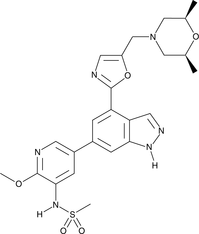Chemicals
Showing 21151–21300 of 41137 results
-
GSK0660 is the first reported antagonist of PPARβ/δ (IC50 = 155 nM) with no measurable affinity for PPARα or PPARγ (IC50s ≥ 10 μM).{32576} Because of the limited bioavailability of GSK0660, the related compound GSK3787 (Item No. 15219) was developed as a selective PPARβ/δ antagonist with more suitable pharmacokinetic properties.{24665}
Brand:CaymanSKU:-GSK0660 is the first reported antagonist of PPARβ/δ (IC50 = 155 nM) with no measurable affinity for PPARα or PPARγ (IC50s ≥ 10 μM).{32576} Because of the limited bioavailability of GSK0660, the related compound GSK3787 (Item No. 15219) was developed as a selective PPARβ/δ antagonist with more suitable pharmacokinetic properties.{24665}
Brand:CaymanSKU:-GSK0660 is the first reported antagonist of PPARβ/δ (IC50 = 155 nM) with no measurable affinity for PPARα or PPARγ (IC50s ≥ 10 μM).{32576} Because of the limited bioavailability of GSK0660, the related compound GSK3787 (Item No. 15219) was developed as a selective PPARβ/δ antagonist with more suitable pharmacokinetic properties.{24665}
Brand:CaymanSKU:-Transient receptor potential vanilloid 4 (TRPV4) is a nonselective cation channel thought to be involved in osmoregulation, hyperalgesia, and control of epithelial cell volume. GSK1016790A is a TRPV4 agonist that has been reported to elicit calcium influx in HEK cells expressing mouse or human TRPV4 (EC50s = 18 and 2.1 nM, respectively).{28187} It has been used to demonstrate a role for TRPV4 in regulating urinary bladder activity and endothelial control of vascular tone.{28187,28188,28189}
Brand:CaymanSKU:-Available on backorder
Transient receptor potential vanilloid 4 (TRPV4) is a nonselective cation channel thought to be involved in osmoregulation, hyperalgesia, and control of epithelial cell volume. GSK1016790A is a TRPV4 agonist that has been reported to elicit calcium influx in HEK cells expressing mouse or human TRPV4 (EC50s = 18 and 2.1 nM, respectively).{28187} It has been used to demonstrate a role for TRPV4 in regulating urinary bladder activity and endothelial control of vascular tone.{28187,28188,28189}
Brand:CaymanSKU:-Available on backorder
Transient receptor potential vanilloid 4 (TRPV4) is a nonselective cation channel thought to be involved in osmoregulation, hyperalgesia, and control of epithelial cell volume. GSK1016790A is a TRPV4 agonist that has been reported to elicit calcium influx in HEK cells expressing mouse or human TRPV4 (EC50s = 18 and 2.1 nM, respectively).{28187} It has been used to demonstrate a role for TRPV4 in regulating urinary bladder activity and endothelial control of vascular tone.{28187,28188,28189}
Brand:CaymanSKU:-Available on backorder
Transient receptor potential vanilloid 4 (TRPV4) is a nonselective cation channel thought to be involved in osmoregulation, hyperalgesia, and control of epithelial cell volume. GSK1016790A is a TRPV4 agonist that has been reported to elicit calcium influx in HEK cells expressing mouse or human TRPV4 (EC50s = 18 and 2.1 nM, respectively).{28187} It has been used to demonstrate a role for TRPV4 in regulating urinary bladder activity and endothelial control of vascular tone.{28187,28188,28189}
Brand:CaymanSKU:-Available on backorder
PI 3-kinase α (PI3Kα) is a critical regulator of cell growth and transformation. Its signaling pathway is the most commonly mutated pathway in human cancers. GSK1059615 is a potent, reversible, ATP-competitive, thiazolidinedione inhibitor of PI3Kα (IC50 = 2 nM) and the common activating mutants of p110α (E542K, E545K, and H1047R) found in cancer.{20675,20676} It prevents proliferation in BT474 tumor xenografts and reduces MAPK signaling following twice daily dosing at 25 mg/kg.{20675}
Brand:CaymanSKU:11569 - 10 mgAvailable on backorder
PI 3-kinase α (PI3Kα) is a critical regulator of cell growth and transformation. Its signaling pathway is the most commonly mutated pathway in human cancers. GSK1059615 is a potent, reversible, ATP-competitive, thiazolidinedione inhibitor of PI3Kα (IC50 = 2 nM) and the common activating mutants of p110α (E542K, E545K, and H1047R) found in cancer.{20675,20676} It prevents proliferation in BT474 tumor xenografts and reduces MAPK signaling following twice daily dosing at 25 mg/kg.{20675}
Brand:CaymanSKU:11569 - 25 mgAvailable on backorder
PI 3-kinase α (PI3Kα) is a critical regulator of cell growth and transformation. Its signaling pathway is the most commonly mutated pathway in human cancers. GSK1059615 is a potent, reversible, ATP-competitive, thiazolidinedione inhibitor of PI3Kα (IC50 = 2 nM) and the common activating mutants of p110α (E542K, E545K, and H1047R) found in cancer.{20675,20676} It prevents proliferation in BT474 tumor xenografts and reduces MAPK signaling following twice daily dosing at 25 mg/kg.{20675}
Brand:CaymanSKU:11569 - 5 mgAvailable on backorder
PI 3-kinase α (PI3Kα) is a critical regulator of cell growth and transformation. Its signaling pathway is the most commonly mutated pathway in human cancers. GSK1059615 is a potent, reversible, ATP-competitive, thiazolidinedione inhibitor of PI3Kα (IC50 = 2 nM) and the common activating mutants of p110α (E542K, E545K, and H1047R) found in cancer.{20675,20676} It prevents proliferation in BT474 tumor xenografts and reduces MAPK signaling following twice daily dosing at 25 mg/kg.{20675}
Brand:CaymanSKU:11569 - 50 mgAvailable on backorder
Protein arginine deiminase 4 (PAD4) mediates the transformation of protein arginine into citrulline. Citrullination of proteins has normal roles in gene regulation and pathological roles in immunological and inflammatory diseases.{18134} GSK106 is an inactive control for the selective PAD4 inhibitors, GSK484 (Item No. 17488) and GSK199 (Item No. 17489).{28376} It does not inhibit PAD4 nor does it prevent the citrullination of PAD4 target proteins or the formation of neutrophil extracellular traps in mouse or human neutrophils (IC50s > 100 µM).{28376} See the Structural Genomics Consortium (SGC) website for more information on both GSK484 and GSK106.
Brand:CaymanSKU:-Available on backorder
Protein arginine deiminase 4 (PAD4) mediates the transformation of protein arginine into citrulline. Citrullination of proteins has normal roles in gene regulation and pathological roles in immunological and inflammatory diseases.{18134} GSK106 is an inactive control for the selective PAD4 inhibitors, GSK484 (Item No. 17488) and GSK199 (Item No. 17489).{28376} It does not inhibit PAD4 nor does it prevent the citrullination of PAD4 target proteins or the formation of neutrophil extracellular traps in mouse or human neutrophils (IC50s > 100 µM).{28376} See the Structural Genomics Consortium (SGC) website for more information on both GSK484 and GSK106.
Brand:CaymanSKU:-Available on backorder
Protein arginine deiminase 4 (PAD4) mediates the transformation of protein arginine into citrulline. Citrullination of proteins has normal roles in gene regulation and pathological roles in immunological and inflammatory diseases.{18134} GSK106 is an inactive control for the selective PAD4 inhibitors, GSK484 (Item No. 17488) and GSK199 (Item No. 17489).{28376} It does not inhibit PAD4 nor does it prevent the citrullination of PAD4 target proteins or the formation of neutrophil extracellular traps in mouse or human neutrophils (IC50s > 100 µM).{28376} See the Structural Genomics Consortium (SGC) website for more information on both GSK484 and GSK106.
Brand:CaymanSKU:-Available on backorder
Protein arginine deiminase 4 (PAD4) mediates the transformation of protein arginine into citrulline. Citrullination of proteins has normal roles in gene regulation and pathological roles in immunological and inflammatory diseases.{18134} GSK106 is an inactive control for the selective PAD4 inhibitors, GSK484 (Item No. 17488) and GSK199 (Item No. 17489).{28376} It does not inhibit PAD4 nor does it prevent the citrullination of PAD4 target proteins or the formation of neutrophil extracellular traps in mouse or human neutrophils (IC50s > 100 µM).{28376} See the Structural Genomics Consortium (SGC) website for more information on both GSK484 and GSK106.
Brand:CaymanSKU:-Available on backorder
GSK1070916 is a potent and ATP-competitive inhibitor of Aurora kinases B and C (Kis = 0.38 and 1.5 nM, respectively).{43055} It is >250-fold selective for Aurora B and C over Aurora A. GSK1070916 inhibits proliferation of A549 lung cancer cells in vitro (EC50 = 7 nM). It also inhibits proliferation in a panel of 100 tumor cell lines (EC50s = via induction of polyploidy and apoptosis.{43056} In vivo, GSK1070916 inhibits histone H3 phosphorylation in a COLO 205 mouse xenograft model and induces tumor regression in an HL-60 mouse xenograft model.{43055} It also reduces tumor growth in 10 mouse xenograft models, including models of breast, colon, and lung carcinomas as well as leukemias.{43056}
Brand:CaymanSKU:22953 - 1 mgAvailable on backorder
GSK1070916 is a potent and ATP-competitive inhibitor of Aurora kinases B and C (Kis = 0.38 and 1.5 nM, respectively).{43055} It is >250-fold selective for Aurora B and C over Aurora A. GSK1070916 inhibits proliferation of A549 lung cancer cells in vitro (EC50 = 7 nM). It also inhibits proliferation in a panel of 100 tumor cell lines (EC50s = via induction of polyploidy and apoptosis.{43056} In vivo, GSK1070916 inhibits histone H3 phosphorylation in a COLO 205 mouse xenograft model and induces tumor regression in an HL-60 mouse xenograft model.{43055} It also reduces tumor growth in 10 mouse xenograft models, including models of breast, colon, and lung carcinomas as well as leukemias.{43056}
Brand:CaymanSKU:22953 - 10 mgAvailable on backorder
GSK1070916 is a potent and ATP-competitive inhibitor of Aurora kinases B and C (Kis = 0.38 and 1.5 nM, respectively).{43055} It is >250-fold selective for Aurora B and C over Aurora A. GSK1070916 inhibits proliferation of A549 lung cancer cells in vitro (EC50 = 7 nM). It also inhibits proliferation in a panel of 100 tumor cell lines (EC50s = via induction of polyploidy and apoptosis.{43056} In vivo, GSK1070916 inhibits histone H3 phosphorylation in a COLO 205 mouse xenograft model and induces tumor regression in an HL-60 mouse xenograft model.{43055} It also reduces tumor growth in 10 mouse xenograft models, including models of breast, colon, and lung carcinomas as well as leukemias.{43056}
Brand:CaymanSKU:22953 - 25 mgAvailable on backorder
GSK1070916 is a potent and ATP-competitive inhibitor of Aurora kinases B and C (Kis = 0.38 and 1.5 nM, respectively).{43055} It is >250-fold selective for Aurora B and C over Aurora A. GSK1070916 inhibits proliferation of A549 lung cancer cells in vitro (EC50 = 7 nM). It also inhibits proliferation in a panel of 100 tumor cell lines (EC50s = via induction of polyploidy and apoptosis.{43056} In vivo, GSK1070916 inhibits histone H3 phosphorylation in a COLO 205 mouse xenograft model and induces tumor regression in an HL-60 mouse xenograft model.{43055} It also reduces tumor growth in 10 mouse xenograft models, including models of breast, colon, and lung carcinomas as well as leukemias.{43056}
Brand:CaymanSKU:22953 - 5 mgAvailable on backorder
Protein arginine deiminase 4 (PAD4) mediates the transformation of protein arginine into citrulline. Citrullination of proteins has normal roles in gene regulation and pathological roles in immunological and inflammatory diseases.{18134} GSK121 is the initial compound identified in a screen for PAD4 inhibitors and was optimized to produce the more potent PAD4 inhibitors, GSK484 (Item No. 17488) and GSK199 (Item No. 17489).{28376} GSK121 was shown to inhibit the citrullination of PAD4 target proteins in a functional assay with an IC50 value of 3.2 µM.{28376}
Brand:CaymanSKU:-Available on backorder
Protein arginine deiminase 4 (PAD4) mediates the transformation of protein arginine into citrulline. Citrullination of proteins has normal roles in gene regulation and pathological roles in immunological and inflammatory diseases.{18134} GSK121 is the initial compound identified in a screen for PAD4 inhibitors and was optimized to produce the more potent PAD4 inhibitors, GSK484 (Item No. 17488) and GSK199 (Item No. 17489).{28376} GSK121 was shown to inhibit the citrullination of PAD4 target proteins in a functional assay with an IC50 value of 3.2 µM.{28376}
Brand:CaymanSKU:-Available on backorder
Protein arginine deiminase 4 (PAD4) mediates the transformation of protein arginine into citrulline. Citrullination of proteins has normal roles in gene regulation and pathological roles in immunological and inflammatory diseases.{18134} GSK121 is the initial compound identified in a screen for PAD4 inhibitors and was optimized to produce the more potent PAD4 inhibitors, GSK484 (Item No. 17488) and GSK199 (Item No. 17489).{28376} GSK121 was shown to inhibit the citrullination of PAD4 target proteins in a functional assay with an IC50 value of 3.2 µM.{28376}
Brand:CaymanSKU:-Available on backorder
Protein arginine deiminase 4 (PAD4) mediates the transformation of protein arginine into citrulline. Citrullination of proteins has normal roles in gene regulation and pathological roles in immunological and inflammatory diseases.{18134} GSK121 is the initial compound identified in a screen for PAD4 inhibitors and was optimized to produce the more potent PAD4 inhibitors, GSK484 (Item No. 17488) and GSK199 (Item No. 17489).{28376} GSK121 was shown to inhibit the citrullination of PAD4 target proteins in a functional assay with an IC50 value of 3.2 µM.{28376}
Brand:CaymanSKU:-Available on backorder
The histone H3 lysine 27 (H3K27) methyltransferase EZH2 plays an important role in regulating gene expression, and its aberrant activity is linked to the onset and progression of cancer.{18930} GSK126 is a selective, S-adenosyl-methionine-competitive small molecule inhibitor of EZH2 methyltransferase activity (Ki = 0.57 nM; IC50 = 9.9 nM versus that of EZH1: Ki = 89 nM; IC50 = 680 nM).{25456} It is more than 1,000-fold selective for EZH2 over other histone methyltranferases, including both SET-domain-containing and non-SET-domain-containing methyltransferases.{25456} At concentrations of 7-252 nM, it has been shown to inhibit global H3K27 trimethylation levels and to reactivate silenced PRC2 target genes.{25456} Furthermore, GSK126 can inhibit the proliferation of EZH2 mutant DLBCL cell lines (IC50 = 28-61 nM) as well as the growth of EZH2 mutant DLBCL xenografts in mice receiving a daily dose of 50 mg/kg.{25456}
Brand:CaymanSKU:-The histone H3 lysine 27 (H3K27) methyltransferase EZH2 plays an important role in regulating gene expression, and its aberrant activity is linked to the onset and progression of cancer.{18930} GSK126 is a selective, S-adenosyl-methionine-competitive small molecule inhibitor of EZH2 methyltransferase activity (Ki = 0.57 nM; IC50 = 9.9 nM versus that of EZH1: Ki = 89 nM; IC50 = 680 nM).{25456} It is more than 1,000-fold selective for EZH2 over other histone methyltranferases, including both SET-domain-containing and non-SET-domain-containing methyltransferases.{25456} At concentrations of 7-252 nM, it has been shown to inhibit global H3K27 trimethylation levels and to reactivate silenced PRC2 target genes.{25456} Furthermore, GSK126 can inhibit the proliferation of EZH2 mutant DLBCL cell lines (IC50 = 28-61 nM) as well as the growth of EZH2 mutant DLBCL xenografts in mice receiving a daily dose of 50 mg/kg.{25456}
Brand:CaymanSKU:-The histone H3 lysine 27 (H3K27) methyltransferase EZH2 plays an important role in regulating gene expression, and its aberrant activity is linked to the onset and progression of cancer.{18930} GSK126 is a selective, S-adenosyl-methionine-competitive small molecule inhibitor of EZH2 methyltransferase activity (Ki = 0.57 nM; IC50 = 9.9 nM versus that of EZH1: Ki = 89 nM; IC50 = 680 nM).{25456} It is more than 1,000-fold selective for EZH2 over other histone methyltranferases, including both SET-domain-containing and non-SET-domain-containing methyltransferases.{25456} At concentrations of 7-252 nM, it has been shown to inhibit global H3K27 trimethylation levels and to reactivate silenced PRC2 target genes.{25456} Furthermore, GSK126 can inhibit the proliferation of EZH2 mutant DLBCL cell lines (IC50 = 28-61 nM) as well as the growth of EZH2 mutant DLBCL xenografts in mice receiving a daily dose of 50 mg/kg.{25456}
Brand:CaymanSKU:-GSK1292263 is an agonist of G protein-coupled receptor 119 (GPR119; EC50 = 43.9 nM in CHO-K1 cells expressing human receptors).{47194} It inhibits increases in sterol regulatory element binding protein-1 (SREBP-1) levels induced by the LXR agonist T0901317 and increases activation of AMPK in HepG2 cells in a concentration-dependent manner.{36741} GSK1292263 also inhibits breast cancer resistant protein (BCRP) and organic anion transporting polypeptide 1B1 (OATP1B1) by 52 and 40%, respectively, when used at a concentration of 3 μM.{47195}
Brand:CaymanSKU:26181 - 10 mgAvailable on backorder
GSK1292263 is an agonist of G protein-coupled receptor 119 (GPR119; EC50 = 43.9 nM in CHO-K1 cells expressing human receptors).{47194} It inhibits increases in sterol regulatory element binding protein-1 (SREBP-1) levels induced by the LXR agonist T0901317 and increases activation of AMPK in HepG2 cells in a concentration-dependent manner.{36741} GSK1292263 also inhibits breast cancer resistant protein (BCRP) and organic anion transporting polypeptide 1B1 (OATP1B1) by 52 and 40%, respectively, when used at a concentration of 3 μM.{47195}
Brand:CaymanSKU:26181 - 25 mgAvailable on backorder
GSK1292263 is an agonist of G protein-coupled receptor 119 (GPR119; EC50 = 43.9 nM in CHO-K1 cells expressing human receptors).{47194} It inhibits increases in sterol regulatory element binding protein-1 (SREBP-1) levels induced by the LXR agonist T0901317 and increases activation of AMPK in HepG2 cells in a concentration-dependent manner.{36741} GSK1292263 also inhibits breast cancer resistant protein (BCRP) and organic anion transporting polypeptide 1B1 (OATP1B1) by 52 and 40%, respectively, when used at a concentration of 3 μM.{47195}
Brand:CaymanSKU:26181 - 5 mgAvailable on backorder
GSK1292263 is an agonist of G protein-coupled receptor 119 (GPR119; EC50 = 43.9 nM in CHO-K1 cells expressing human receptors).{47194} It inhibits increases in sterol regulatory element binding protein-1 (SREBP-1) levels induced by the LXR agonist T0901317 and increases activation of AMPK in HepG2 cells in a concentration-dependent manner.{36741} GSK1292263 also inhibits breast cancer resistant protein (BCRP) and organic anion transporting polypeptide 1B1 (OATP1B1) by 52 and 40%, respectively, when used at a concentration of 3 μM.{47195}
Brand:CaymanSKU:26181 - 50 mgAvailable on backorder
GPR120 (Free Fatty Acid Receptor 4; FFAR4) is a G protein-coupled receptor expressed in intestine, adipocytes, and pro-inflammatory macrophages that is activated by long chain free fatty acids.{27421,22326} GSK137647A is a diarylsulfonamide that acts as a selective agonist of GPR120 (EC50s = 0.5, 0.63, and 0.79 µM for human, mouse, and rat receptors, respectively).{28990,28870} It is selective for GPR120 over a panel of 61 other targets, including other FFARs. Like the natural GPR120 ligand linoleic acid, GSK137647A dose-dependently stimulates insulin secretion by mouse insulinoma MIN6 cells under high glucose conditions.{28870} It also modestly stimulates the production of glucagon-like peptide-1 in taste bud cells and human intestinal NCI-H716 cells.{28990,28870}
Brand:CaymanSKU:-Available on backorder
GPR120 (Free Fatty Acid Receptor 4; FFAR4) is a G protein-coupled receptor expressed in intestine, adipocytes, and pro-inflammatory macrophages that is activated by long chain free fatty acids.{27421,22326} GSK137647A is a diarylsulfonamide that acts as a selective agonist of GPR120 (EC50s = 0.5, 0.63, and 0.79 µM for human, mouse, and rat receptors, respectively).{28990,28870} It is selective for GPR120 over a panel of 61 other targets, including other FFARs. Like the natural GPR120 ligand linoleic acid, GSK137647A dose-dependently stimulates insulin secretion by mouse insulinoma MIN6 cells under high glucose conditions.{28870} It also modestly stimulates the production of glucagon-like peptide-1 in taste bud cells and human intestinal NCI-H716 cells.{28990,28870}
Brand:CaymanSKU:-Available on backorder
GPR120 (Free Fatty Acid Receptor 4; FFAR4) is a G protein-coupled receptor expressed in intestine, adipocytes, and pro-inflammatory macrophages that is activated by long chain free fatty acids.{27421,22326} GSK137647A is a diarylsulfonamide that acts as a selective agonist of GPR120 (EC50s = 0.5, 0.63, and 0.79 µM for human, mouse, and rat receptors, respectively).{28990,28870} It is selective for GPR120 over a panel of 61 other targets, including other FFARs. Like the natural GPR120 ligand linoleic acid, GSK137647A dose-dependently stimulates insulin secretion by mouse insulinoma MIN6 cells under high glucose conditions.{28870} It also modestly stimulates the production of glucagon-like peptide-1 in taste bud cells and human intestinal NCI-H716 cells.{28990,28870}
Brand:CaymanSKU:-Available on backorder
GPR120 (Free Fatty Acid Receptor 4; FFAR4) is a G protein-coupled receptor expressed in intestine, adipocytes, and pro-inflammatory macrophages that is activated by long chain free fatty acids.{27421,22326} GSK137647A is a diarylsulfonamide that acts as a selective agonist of GPR120 (EC50s = 0.5, 0.63, and 0.79 µM for human, mouse, and rat receptors, respectively).{28990,28870} It is selective for GPR120 over a panel of 61 other targets, including other FFARs. Like the natural GPR120 ligand linoleic acid, GSK137647A dose-dependently stimulates insulin secretion by mouse insulinoma MIN6 cells under high glucose conditions.{28870} It also modestly stimulates the production of glucagon-like peptide-1 in taste bud cells and human intestinal NCI-H716 cells.{28990,28870}
Brand:CaymanSKU:-Available on backorder
GSK180736A is an inhibitor of Rho-associated kinase 1 (ROCK-I; IC50 = 14 nM) and G protein-coupled receptor kinase 2 (GRK2; IC50 = 0.77 µM).{26327,42595} It is selective for GRK2 over GRK1, GRK5, and PKA (IC50 = >100 µM for all) and selective for ROCK-I over RSK1 and p20S6K (IC50s = 3,100 and 2,850 nM, respectively).{26327,42595} GSK180736A increases maximum contractility in isolated mouse cardiomyocytes when used at a concentration of 1 µM.{42595}
Brand:CaymanSKU:26182 - 10 mgAvailable on backorder
GSK180736A is an inhibitor of Rho-associated kinase 1 (ROCK-I; IC50 = 14 nM) and G protein-coupled receptor kinase 2 (GRK2; IC50 = 0.77 µM).{26327,42595} It is selective for GRK2 over GRK1, GRK5, and PKA (IC50 = >100 µM for all) and selective for ROCK-I over RSK1 and p20S6K (IC50s = 3,100 and 2,850 nM, respectively).{26327,42595} GSK180736A increases maximum contractility in isolated mouse cardiomyocytes when used at a concentration of 1 µM.{42595}
Brand:CaymanSKU:26182 - 25 mgAvailable on backorder
GSK180736A is an inhibitor of Rho-associated kinase 1 (ROCK-I; IC50 = 14 nM) and G protein-coupled receptor kinase 2 (GRK2; IC50 = 0.77 µM).{26327,42595} It is selective for GRK2 over GRK1, GRK5, and PKA (IC50 = >100 µM for all) and selective for ROCK-I over RSK1 and p20S6K (IC50s = 3,100 and 2,850 nM, respectively).{26327,42595} GSK180736A increases maximum contractility in isolated mouse cardiomyocytes when used at a concentration of 1 µM.{42595}
Brand:CaymanSKU:26182 - 5 mgAvailable on backorder
GSK180736A is an inhibitor of Rho-associated kinase 1 (ROCK-I; IC50 = 14 nM) and G protein-coupled receptor kinase 2 (GRK2; IC50 = 0.77 µM).{26327,42595} It is selective for GRK2 over GRK1, GRK5, and PKA (IC50 = >100 µM for all) and selective for ROCK-I over RSK1 and p20S6K (IC50s = 3,100 and 2,850 nM, respectively).{26327,42595} GSK180736A increases maximum contractility in isolated mouse cardiomyocytes when used at a concentration of 1 µM.{42595}
Brand:CaymanSKU:26182 - 50 mgAvailable on backorder
GSK1838705A is an inhibitor of the insulin-like growth factor-1 receptor (IGF-1R) and the insulin receptor (IR; IC50s = 2 and 1.6 nM, respectively).{41768} It is selective for IGF-1R and IR over a panel of 47 kinases (IC50s = >1,600 nM), however, it also inhibits anaplastic lymphoma kinase (ALK; IC50 = 0.5 nM). GSK1838705A inhibits IGF-1 and insulin-induced phosphorylation of IGF-1R and IR in a concentration-dependent manner as well as phosphorylation of the downstream signaling markers Akt, IRS-1, and ERK in MCF-7 breast carcinoma cells. It inhibits growth in a panel of cancer cell lines (EC50s = 24-8,378 nM) with the IGF-1R signaling-dependent multiple myeloma and Ewing’s sarcoma cell lines being the most sensitive. In vivo, GSK1838705A completely inhibits IGF-1-induced phosphorylation of IGF-1R, Akt, and IRS-1 as well as reduces tumor growth in the COLO 205 and NIH-3T2/LISN mouse xenograft models when administered at doses of ≥1 and ≥10 mg/kg, respectively. It also induces tumor cell apoptosis and reduces tumor growth in U87MG glioma and PC3R prostate cancer mouse xenograft models.{41769,41770}
Brand:CaymanSKU:24904 - 10 mgAvailable on backorder
GSK1838705A is an inhibitor of the insulin-like growth factor-1 receptor (IGF-1R) and the insulin receptor (IR; IC50s = 2 and 1.6 nM, respectively).{41768} It is selective for IGF-1R and IR over a panel of 47 kinases (IC50s = >1,600 nM), however, it also inhibits anaplastic lymphoma kinase (ALK; IC50 = 0.5 nM). GSK1838705A inhibits IGF-1 and insulin-induced phosphorylation of IGF-1R and IR in a concentration-dependent manner as well as phosphorylation of the downstream signaling markers Akt, IRS-1, and ERK in MCF-7 breast carcinoma cells. It inhibits growth in a panel of cancer cell lines (EC50s = 24-8,378 nM) with the IGF-1R signaling-dependent multiple myeloma and Ewing’s sarcoma cell lines being the most sensitive. In vivo, GSK1838705A completely inhibits IGF-1-induced phosphorylation of IGF-1R, Akt, and IRS-1 as well as reduces tumor growth in the COLO 205 and NIH-3T2/LISN mouse xenograft models when administered at doses of ≥1 and ≥10 mg/kg, respectively. It also induces tumor cell apoptosis and reduces tumor growth in U87MG glioma and PC3R prostate cancer mouse xenograft models.{41769,41770}
Brand:CaymanSKU:24904 - 25 mgAvailable on backorder
GSK1838705A is an inhibitor of the insulin-like growth factor-1 receptor (IGF-1R) and the insulin receptor (IR; IC50s = 2 and 1.6 nM, respectively).{41768} It is selective for IGF-1R and IR over a panel of 47 kinases (IC50s = >1,600 nM), however, it also inhibits anaplastic lymphoma kinase (ALK; IC50 = 0.5 nM). GSK1838705A inhibits IGF-1 and insulin-induced phosphorylation of IGF-1R and IR in a concentration-dependent manner as well as phosphorylation of the downstream signaling markers Akt, IRS-1, and ERK in MCF-7 breast carcinoma cells. It inhibits growth in a panel of cancer cell lines (EC50s = 24-8,378 nM) with the IGF-1R signaling-dependent multiple myeloma and Ewing’s sarcoma cell lines being the most sensitive. In vivo, GSK1838705A completely inhibits IGF-1-induced phosphorylation of IGF-1R, Akt, and IRS-1 as well as reduces tumor growth in the COLO 205 and NIH-3T2/LISN mouse xenograft models when administered at doses of ≥1 and ≥10 mg/kg, respectively. It also induces tumor cell apoptosis and reduces tumor growth in U87MG glioma and PC3R prostate cancer mouse xenograft models.{41769,41770}
Brand:CaymanSKU:24904 - 5 mgAvailable on backorder
GSK1838705A is an inhibitor of the insulin-like growth factor-1 receptor (IGF-1R) and the insulin receptor (IR; IC50s = 2 and 1.6 nM, respectively).{41768} It is selective for IGF-1R and IR over a panel of 47 kinases (IC50s = >1,600 nM), however, it also inhibits anaplastic lymphoma kinase (ALK; IC50 = 0.5 nM). GSK1838705A inhibits IGF-1 and insulin-induced phosphorylation of IGF-1R and IR in a concentration-dependent manner as well as phosphorylation of the downstream signaling markers Akt, IRS-1, and ERK in MCF-7 breast carcinoma cells. It inhibits growth in a panel of cancer cell lines (EC50s = 24-8,378 nM) with the IGF-1R signaling-dependent multiple myeloma and Ewing’s sarcoma cell lines being the most sensitive. In vivo, GSK1838705A completely inhibits IGF-1-induced phosphorylation of IGF-1R, Akt, and IRS-1 as well as reduces tumor growth in the COLO 205 and NIH-3T2/LISN mouse xenograft models when administered at doses of ≥1 and ≥10 mg/kg, respectively. It also induces tumor cell apoptosis and reduces tumor growth in U87MG glioma and PC3R prostate cancer mouse xenograft models.{41769,41770}
Brand:CaymanSKU:24904 - 50 mgAvailable on backorder
GSK1904529A is a dual inhibitor of the insulin receptor (InsR) and insulin-like growth factor 1 receptor (IGF-1R) kinases (IC50s = 25 and 27 nM, respectively, in a cell-free assay).{48691} It selectively inhibits InsR and IGF-1R kinases over a panel of 45 serine/threonine and tyrosine kinases (IC50s = >1 µM for all). GSK1904529A decreases proliferation of 13 cancer cell lines, including multiple myeloma, sarcoma, colon, and breast cancer cells, with IC50 values ranging from 35 to 189 nM in a panel of 35 cell lines. It reduces tumor growth in NIH3T3-LISN, COLO 205, HT-29, and BxPC3 mouse xenograft models when administered at a dose of 30 mg/kg for 21 days.
Brand:CaymanSKU:29155 - 1 mgAvailable on backorder
GSK1904529A is a dual inhibitor of the insulin receptor (InsR) and insulin-like growth factor 1 receptor (IGF-1R) kinases (IC50s = 25 and 27 nM, respectively, in a cell-free assay).{48691} It selectively inhibits InsR and IGF-1R kinases over a panel of 45 serine/threonine and tyrosine kinases (IC50s = >1 µM for all). GSK1904529A decreases proliferation of 13 cancer cell lines, including multiple myeloma, sarcoma, colon, and breast cancer cells, with IC50 values ranging from 35 to 189 nM in a panel of 35 cell lines. It reduces tumor growth in NIH3T3-LISN, COLO 205, HT-29, and BxPC3 mouse xenograft models when administered at a dose of 30 mg/kg for 21 days.
Brand:CaymanSKU:29155 - 10 mgAvailable on backorder
GSK1904529A is a dual inhibitor of the insulin receptor (InsR) and insulin-like growth factor 1 receptor (IGF-1R) kinases (IC50s = 25 and 27 nM, respectively, in a cell-free assay).{48691} It selectively inhibits InsR and IGF-1R kinases over a panel of 45 serine/threonine and tyrosine kinases (IC50s = >1 µM for all). GSK1904529A decreases proliferation of 13 cancer cell lines, including multiple myeloma, sarcoma, colon, and breast cancer cells, with IC50 values ranging from 35 to 189 nM in a panel of 35 cell lines. It reduces tumor growth in NIH3T3-LISN, COLO 205, HT-29, and BxPC3 mouse xenograft models when administered at a dose of 30 mg/kg for 21 days.
Brand:CaymanSKU:29155 - 25 mgAvailable on backorder
GSK1904529A is a dual inhibitor of the insulin receptor (InsR) and insulin-like growth factor 1 receptor (IGF-1R) kinases (IC50s = 25 and 27 nM, respectively, in a cell-free assay).{48691} It selectively inhibits InsR and IGF-1R kinases over a panel of 45 serine/threonine and tyrosine kinases (IC50s = >1 µM for all). GSK1904529A decreases proliferation of 13 cancer cell lines, including multiple myeloma, sarcoma, colon, and breast cancer cells, with IC50 values ranging from 35 to 189 nM in a panel of 35 cell lines. It reduces tumor growth in NIH3T3-LISN, COLO 205, HT-29, and BxPC3 mouse xenograft models when administered at a dose of 30 mg/kg for 21 days.
Brand:CaymanSKU:29155 - 5 mgAvailable on backorder
Protein arginine deiminase 4 (PAD4) mediates the transformation of protein arginine into citrulline. Citrullination of proteins has normal roles in gene regulation and pathological roles in immunological and inflammatory diseases.{18134} GSK199 is a reversible inhibitor of PAD4 (IC50 = 200 nM) that binds to the low-calcium form of the enzyme and is selective for PAD4 over PAD1-3.{28376}It is less potent than the related PAD4 inhibitor GSK484 (Item No. 17488), which demonstrates an IC50 value of 50 nM.{28376} GSK199 can inhibit the citrullination of PAD4 target proteins and diminish the formation of neutrophil extracellular traps in mouse neutrophils.{28376}
Brand:CaymanSKU:-Available on backorder
Protein arginine deiminase 4 (PAD4) mediates the transformation of protein arginine into citrulline. Citrullination of proteins has normal roles in gene regulation and pathological roles in immunological and inflammatory diseases.{18134} GSK199 is a reversible inhibitor of PAD4 (IC50 = 200 nM) that binds to the low-calcium form of the enzyme and is selective for PAD4 over PAD1-3.{28376}It is less potent than the related PAD4 inhibitor GSK484 (Item No. 17488), which demonstrates an IC50 value of 50 nM.{28376} GSK199 can inhibit the citrullination of PAD4 target proteins and diminish the formation of neutrophil extracellular traps in mouse neutrophils.{28376}
Brand:CaymanSKU:-Available on backorder
Protein arginine deiminase 4 (PAD4) mediates the transformation of protein arginine into citrulline. Citrullination of proteins has normal roles in gene regulation and pathological roles in immunological and inflammatory diseases.{18134} GSK199 is a reversible inhibitor of PAD4 (IC50 = 200 nM) that binds to the low-calcium form of the enzyme and is selective for PAD4 over PAD1-3.{28376}It is less potent than the related PAD4 inhibitor GSK484 (Item No. 17488), which demonstrates an IC50 value of 50 nM.{28376} GSK199 can inhibit the citrullination of PAD4 target proteins and diminish the formation of neutrophil extracellular traps in mouse neutrophils.{28376}
Brand:CaymanSKU:-Available on backorder
Protein arginine deiminase 4 (PAD4) mediates the transformation of protein arginine into citrulline. Citrullination of proteins has normal roles in gene regulation and pathological roles in immunological and inflammatory diseases.{18134} GSK199 is a reversible inhibitor of PAD4 (IC50 = 200 nM) that binds to the low-calcium form of the enzyme and is selective for PAD4 over PAD1-3.{28376}It is less potent than the related PAD4 inhibitor GSK484 (Item No. 17488), which demonstrates an IC50 value of 50 nM.{28376} GSK199 can inhibit the citrullination of PAD4 target proteins and diminish the formation of neutrophil extracellular traps in mouse neutrophils.{28376}
Brand:CaymanSKU:-Available on backorder
GSK2018682 is an agonist of sphingosine-1-phosphate receptor 1 (S1P1) and S1P5.{57235} It is selective for S1P1 and S1P5 over S1P2, S1P3, and S1P4 receptors. GSK2018682 is efficacious in a mouse model of experimental autoimmune encephalomyelitis (EAE).
Brand:CaymanSKU:31437 - 10 mgAvailable on backorder
GSK2018682 is an agonist of sphingosine-1-phosphate receptor 1 (S1P1) and S1P5.{57235} It is selective for S1P1 and S1P5 over S1P2, S1P3, and S1P4 receptors. GSK2018682 is efficacious in a mouse model of experimental autoimmune encephalomyelitis (EAE).
Brand:CaymanSKU:31437 - 25 mgAvailable on backorder
GSK2018682 is an agonist of sphingosine-1-phosphate receptor 1 (S1P1) and S1P5.{57235} It is selective for S1P1 and S1P5 over S1P2, S1P3, and S1P4 receptors. GSK2018682 is efficacious in a mouse model of experimental autoimmune encephalomyelitis (EAE).
Brand:CaymanSKU:31437 - 5 mgAvailable on backorder
GSK2018682 is an agonist of sphingosine-1-phosphate receptor 1 (S1P1) and S1P5.{57235} It is selective for S1P1 and S1P5 over S1P2, S1P3, and S1P4 receptors. GSK2018682 is efficacious in a mouse model of experimental autoimmune encephalomyelitis (EAE).
Brand:CaymanSKU:31437 - 50 mgAvailable on backorder
GSK2033 is an antagonist of liver X receptor α (LXRα) and LXRβ (IC50s = 0.1 and 0.398 µM, respectively) that has no agonist activity in an LXR transactivation assay.{36795} It inhibits LXR agonist-induced and basal expression of the LXR target genes ATP-binding cassette transporter 1 (ABCA1) and sterol regulatory element binding protein 1c (SREBP-1c) in THP-1 and HepG2 cells, respectively. However, GSK2033 binds promiscuously to a variety of nuclear receptors including RORγ, RXRα, ERα, and ERβ in a nuclear receptor specificity assay in HEK293 cells and, in a mouse model of non-alcoholic fatty liver disease (NAFLD), it induces the expression of fatty acid synthase and SREBP-1.{36796}
Brand:CaymanSKU:25443 - 1 mgAvailable on backorder
GSK2033 is an antagonist of liver X receptor α (LXRα) and LXRβ (IC50s = 0.1 and 0.398 µM, respectively) that has no agonist activity in an LXR transactivation assay.{36795} It inhibits LXR agonist-induced and basal expression of the LXR target genes ATP-binding cassette transporter 1 (ABCA1) and sterol regulatory element binding protein 1c (SREBP-1c) in THP-1 and HepG2 cells, respectively. However, GSK2033 binds promiscuously to a variety of nuclear receptors including RORγ, RXRα, ERα, and ERβ in a nuclear receptor specificity assay in HEK293 cells and, in a mouse model of non-alcoholic fatty liver disease (NAFLD), it induces the expression of fatty acid synthase and SREBP-1.{36796}
Brand:CaymanSKU:25443 - 10 mgAvailable on backorder
GSK2033 is an antagonist of liver X receptor α (LXRα) and LXRβ (IC50s = 0.1 and 0.398 µM, respectively) that has no agonist activity in an LXR transactivation assay.{36795} It inhibits LXR agonist-induced and basal expression of the LXR target genes ATP-binding cassette transporter 1 (ABCA1) and sterol regulatory element binding protein 1c (SREBP-1c) in THP-1 and HepG2 cells, respectively. However, GSK2033 binds promiscuously to a variety of nuclear receptors including RORγ, RXRα, ERα, and ERβ in a nuclear receptor specificity assay in HEK293 cells and, in a mouse model of non-alcoholic fatty liver disease (NAFLD), it induces the expression of fatty acid synthase and SREBP-1.{36796}
Brand:CaymanSKU:25443 - 5 mgAvailable on backorder
GSK2126458 is a potent inhibitor of phosphoinositide 3-kinase isoforms (Kis = 19, 130, 24, and 60 pM for p110α, β, δ, and γ, respectively).{20675} It also inhibits mTOR in both mTORC1 and mTORC2 (Kis = 180 and 300 nM, respectively), as well as several common mutant forms of p110α.{20675} GSK2126458 is orally bioavailable, displays favorable pharmacokinetics, and shows efficacy in tumor growth models.{20675} GSK2126458 positively combines with inhibitors of discoidin domain receptor 1 (DDR1) inhibitor DDR1-IN-1 (Item No. 18092) to suppress the growth of SNU-1040 colorectal cancer cells.{29876}
Brand:CaymanSKU:-Available on backorder
GSK2126458 is a potent inhibitor of phosphoinositide 3-kinase isoforms (Kis = 19, 130, 24, and 60 pM for p110α, β, δ, and γ, respectively).{20675} It also inhibits mTOR in both mTORC1 and mTORC2 (Kis = 180 and 300 nM, respectively), as well as several common mutant forms of p110α.{20675} GSK2126458 is orally bioavailable, displays favorable pharmacokinetics, and shows efficacy in tumor growth models.{20675} GSK2126458 positively combines with inhibitors of discoidin domain receptor 1 (DDR1) inhibitor DDR1-IN-1 (Item No. 18092) to suppress the growth of SNU-1040 colorectal cancer cells.{29876}
Brand:CaymanSKU:-Available on backorder
GSK2126458 is a potent inhibitor of phosphoinositide 3-kinase isoforms (Kis = 19, 130, 24, and 60 pM for p110α, β, δ, and γ, respectively).{20675} It also inhibits mTOR in both mTORC1 and mTORC2 (Kis = 180 and 300 nM, respectively), as well as several common mutant forms of p110α.{20675} GSK2126458 is orally bioavailable, displays favorable pharmacokinetics, and shows efficacy in tumor growth models.{20675} GSK2126458 positively combines with inhibitors of discoidin domain receptor 1 (DDR1) inhibitor DDR1-IN-1 (Item No. 18092) to suppress the growth of SNU-1040 colorectal cancer cells.{29876}
Brand:CaymanSKU:-Available on backorder
GSK2126458 is a potent inhibitor of phosphoinositide 3-kinase isoforms (Kis = 19, 130, 24, and 60 pM for p110α, β, δ, and γ, respectively).{20675} It also inhibits mTOR in both mTORC1 and mTORC2 (Kis = 180 and 300 nM, respectively), as well as several common mutant forms of p110α.{20675} GSK2126458 is orally bioavailable, displays favorable pharmacokinetics, and shows efficacy in tumor growth models.{20675} GSK2126458 positively combines with inhibitors of discoidin domain receptor 1 (DDR1) inhibitor DDR1-IN-1 (Item No. 18092) to suppress the growth of SNU-1040 colorectal cancer cells.{29876}
Brand:CaymanSKU:-Available on backorder
GSK2190915 is a selective inhibitor of human 5-lipoxygenase-activating protein (FLAP; IC50 = 2.9 nM).{48538} It is selective for FLAP over 5-, 12-, and 15-lipoxygenase, leukotriene A4 (LTA4) hydrolase, LTC4 synthase, COX-1, and COX-2 (IC50s = >10 µm for all). GSK2190915 inhibits production of LTB4 induced by the calcium ionophore A23187 (Item No. 11016) in isolated whole blood from human, rat, and mouse (IC50s = 436, 223, and 148 nM, respectively). It decreases increases in the levels of cysteinyl leukotriene (CysLT) and LTB4 induced by lung instillation of A23187 in the bronchoalveolar lavage fluid (BALF) of rats when administered at doses of 1 and 3 mg/kg. GSK219095 (3 mg/kg) also reduces increases in the levels of CysLT, LTB4, myeloperoxidase (MPO), and plasma protein extravasation in a mouse model of peritonitis induced by zymosan in mice.
Brand:CaymanSKU:28600 - 1 mgAvailable on backorder
GSK2193874 is a potent antagonist of TRPV4 channels, blocking the influx of calcium induced by the TRPV4 agonist GSK634775 with IC50 values of 2, 5, and 40 nM for rat, mouse, and human isoforms, respectively.{31400} It is selective for TRPV4 over ~200 other human receptors, channels, and enzymes. GSK2193874 is effective in vivo, as it resolves pulmonary edema resulting from myocardial infarction in mice.{31400} TRPV4 blockade with GSK2193874 does not alter heart rate or blood pressure in rats, although it attenuates decreases in pulmonary and systemic arterial pressures induced by TRPV4 agonists.{31400,31399}
Brand:CaymanSKU:-Available on backorder
GSK2193874 is a potent antagonist of TRPV4 channels, blocking the influx of calcium induced by the TRPV4 agonist GSK634775 with IC50 values of 2, 5, and 40 nM for rat, mouse, and human isoforms, respectively.{31400} It is selective for TRPV4 over ~200 other human receptors, channels, and enzymes. GSK2193874 is effective in vivo, as it resolves pulmonary edema resulting from myocardial infarction in mice.{31400} TRPV4 blockade with GSK2193874 does not alter heart rate or blood pressure in rats, although it attenuates decreases in pulmonary and systemic arterial pressures induced by TRPV4 agonists.{31400,31399}
Brand:CaymanSKU:-Available on backorder
GSK2193874 is a potent antagonist of TRPV4 channels, blocking the influx of calcium induced by the TRPV4 agonist GSK634775 with IC50 values of 2, 5, and 40 nM for rat, mouse, and human isoforms, respectively.{31400} It is selective for TRPV4 over ~200 other human receptors, channels, and enzymes. GSK2193874 is effective in vivo, as it resolves pulmonary edema resulting from myocardial infarction in mice.{31400} TRPV4 blockade with GSK2193874 does not alter heart rate or blood pressure in rats, although it attenuates decreases in pulmonary and systemic arterial pressures induced by TRPV4 agonists.{31400,31399}
Brand:CaymanSKU:-Available on backorder
GSK2193874 is a potent antagonist of TRPV4 channels, blocking the influx of calcium induced by the TRPV4 agonist GSK634775 with IC50 values of 2, 5, and 40 nM for rat, mouse, and human isoforms, respectively.{31400} It is selective for TRPV4 over ~200 other human receptors, channels, and enzymes. GSK2193874 is effective in vivo, as it resolves pulmonary edema resulting from myocardial infarction in mice.{31400} TRPV4 blockade with GSK2193874 does not alter heart rate or blood pressure in rats, although it attenuates decreases in pulmonary and systemic arterial pressures induced by TRPV4 agonists.{31400,31399}
Brand:CaymanSKU:-Available on backorder
GSK2194069 is an inhibitor of fatty acid synthase (FASN) with an IC50 value of 7.7 nM in an assay detecting released CoA.{35126} It is a competitive inhibitor that is selective for the KR domain over the KS domain of FASN, with IC50 values of 29 and >10,000 nM, respectively, in vitro. GSK2194069 decreases incorporation of 13C-labeled acetate into cellular lipids in a dose-dependent manner in KATO-III, MKN-45, and SNU-1 gastric, and A549 non-small cell lung cancer cell lines. It also reduces cell growth of A549 cells (EC50 = 15 nM) and inhibits lipid synthesis without decreasing FASN protein expression.
Brand:CaymanSKU:20022 -Available on backorder
GSK2194069 is an inhibitor of fatty acid synthase (FASN) with an IC50 value of 7.7 nM in an assay detecting released CoA.{35126} It is a competitive inhibitor that is selective for the KR domain over the KS domain of FASN, with IC50 values of 29 and >10,000 nM, respectively, in vitro. GSK2194069 decreases incorporation of 13C-labeled acetate into cellular lipids in a dose-dependent manner in KATO-III, MKN-45, and SNU-1 gastric, and A549 non-small cell lung cancer cell lines. It also reduces cell growth of A549 cells (EC50 = 15 nM) and inhibits lipid synthesis without decreasing FASN protein expression.
Brand:CaymanSKU:20022 -Available on backorder
GSK2194069 is an inhibitor of fatty acid synthase (FASN) with an IC50 value of 7.7 nM in an assay detecting released CoA.{35126} It is a competitive inhibitor that is selective for the KR domain over the KS domain of FASN, with IC50 values of 29 and >10,000 nM, respectively, in vitro. GSK2194069 decreases incorporation of 13C-labeled acetate into cellular lipids in a dose-dependent manner in KATO-III, MKN-45, and SNU-1 gastric, and A549 non-small cell lung cancer cell lines. It also reduces cell growth of A549 cells (EC50 = 15 nM) and inhibits lipid synthesis without decreasing FASN protein expression.
Brand:CaymanSKU:20022 -Available on backorder
GSK2256098 is an inhibitor of focal adhesion kinase (FAK).{42043} It is selective for FAK, inhibiting only FAK greater than 50% in a panel of 261 kinases. GSK2256098 inhibits FAK autophosphorylation at tyrosine 397 (Y397) in OVCAR8 ovarian, U87MG glioblastoma, and A549 lung cancer cell lines (IC50s = 15, 8.5, and 12 nM, respectively). It induces apoptosis and increases PARP levels, decreases viability (IC50 = 25 µM), and inhibits colony formation in L3.6P1 cells. GSK2256098 (75 mg/kg per day) also leads to lower tumor weight and fewer metastases in the Ishikawa orthotopic mouse model of uterine cancer.{42044}
Brand:CaymanSKU:22955 - 1 mgAvailable on backorder
GSK2256098 is an inhibitor of focal adhesion kinase (FAK).{42043} It is selective for FAK, inhibiting only FAK greater than 50% in a panel of 261 kinases. GSK2256098 inhibits FAK autophosphorylation at tyrosine 397 (Y397) in OVCAR8 ovarian, U87MG glioblastoma, and A549 lung cancer cell lines (IC50s = 15, 8.5, and 12 nM, respectively). It induces apoptosis and increases PARP levels, decreases viability (IC50 = 25 µM), and inhibits colony formation in L3.6P1 cells. GSK2256098 (75 mg/kg per day) also leads to lower tumor weight and fewer metastases in the Ishikawa orthotopic mouse model of uterine cancer.{42044}
Brand:CaymanSKU:22955 - 10 mgAvailable on backorder
GSK2256098 is an inhibitor of focal adhesion kinase (FAK).{42043} It is selective for FAK, inhibiting only FAK greater than 50% in a panel of 261 kinases. GSK2256098 inhibits FAK autophosphorylation at tyrosine 397 (Y397) in OVCAR8 ovarian, U87MG glioblastoma, and A549 lung cancer cell lines (IC50s = 15, 8.5, and 12 nM, respectively). It induces apoptosis and increases PARP levels, decreases viability (IC50 = 25 µM), and inhibits colony formation in L3.6P1 cells. GSK2256098 (75 mg/kg per day) also leads to lower tumor weight and fewer metastases in the Ishikawa orthotopic mouse model of uterine cancer.{42044}
Brand:CaymanSKU:22955 - 25 mgAvailable on backorder
GSK2256098 is an inhibitor of focal adhesion kinase (FAK).{42043} It is selective for FAK, inhibiting only FAK greater than 50% in a panel of 261 kinases. GSK2256098 inhibits FAK autophosphorylation at tyrosine 397 (Y397) in OVCAR8 ovarian, U87MG glioblastoma, and A549 lung cancer cell lines (IC50s = 15, 8.5, and 12 nM, respectively). It induces apoptosis and increases PARP levels, decreases viability (IC50 = 25 µM), and inhibits colony formation in L3.6P1 cells. GSK2256098 (75 mg/kg per day) also leads to lower tumor weight and fewer metastases in the Ishikawa orthotopic mouse model of uterine cancer.{42044}
Brand:CaymanSKU:22955 - 5 mgAvailable on backorder
GSK2269557 is an inhibitor of PI3Kδ (pKi = 9.9) that is >1,000-fold selective for PI3Kδ over PI3Kα, β, and γ isoforms.{32991} It is reported to be active in a brown Norway rat acute ovalbumin-induced allergic asthma model of Th2-driven lung inflammation (ED50 = 67 µg/kg).{32991}
Brand:CaymanSKU:-Available on backorder
GSK2269557 is an inhibitor of PI3Kδ (pKi = 9.9) that is >1,000-fold selective for PI3Kδ over PI3Kα, β, and γ isoforms.{32991} It is reported to be active in a brown Norway rat acute ovalbumin-induced allergic asthma model of Th2-driven lung inflammation (ED50 = 67 µg/kg).{32991}
Brand:CaymanSKU:-Available on backorder
GSK2269557 is an inhibitor of PI3Kδ (pKi = 9.9) that is >1,000-fold selective for PI3Kδ over PI3Kα, β, and γ isoforms.{32991} It is reported to be active in a brown Norway rat acute ovalbumin-induced allergic asthma model of Th2-driven lung inflammation (ED50 = 67 µg/kg).{32991}
Brand:CaymanSKU:-Available on backorder
GSK2269557 is an inhibitor of PI3Kδ (pKi = 9.9) that is >1,000-fold selective for PI3Kδ over PI3Kα, β, and γ isoforms.{32991} It is reported to be active in a brown Norway rat acute ovalbumin-induced allergic asthma model of Th2-driven lung inflammation (ED50 = 67 µg/kg).{32991}
Brand:CaymanSKU:-Available on backorder
GSK2292767 is a potent and selective inhibitor of phosphatidylinositol 3-kinase δ (PI3Kδ; Ki = 79 pM).{32991} It has >1,000-fold selectivity for PI3Kδ over isoforms PI3Kα, PI3Kβ, and PI3Kγ with Ki values of 501, 630, and 501 nM, respectively. GSK2292767 is >100-fold selective for PI3Kδ over a panel of 250 kinases. It inhibits IFN-γ and IL-2 production (IC50s = 1.9 and 3.16 nM, respectively) in a human lung parenchyma assay. GSK2292767 also protects against eosinophil recruitment (ED50 = 35 μg/kg) in the brown Norway rat acute ovalbumin model of Th2-driven lung inflammation.
Brand:CaymanSKU:21757 -Out of stock
GSK2292767 is a potent and selective inhibitor of phosphatidylinositol 3-kinase δ (PI3Kδ; Ki = 79 pM).{32991} It has >1,000-fold selectivity for PI3Kδ over isoforms PI3Kα, PI3Kβ, and PI3Kγ with Ki values of 501, 630, and 501 nM, respectively. GSK2292767 is >100-fold selective for PI3Kδ over a panel of 250 kinases. It inhibits IFN-γ and IL-2 production (IC50s = 1.9 and 3.16 nM, respectively) in a human lung parenchyma assay. GSK2292767 also protects against eosinophil recruitment (ED50 = 35 μg/kg) in the brown Norway rat acute ovalbumin model of Th2-driven lung inflammation.
Brand:CaymanSKU:21757 -Out of stock
GSK2292767 is a potent and selective inhibitor of phosphatidylinositol 3-kinase δ (PI3Kδ; Ki = 79 pM).{32991} It has >1,000-fold selectivity for PI3Kδ over isoforms PI3Kα, PI3Kβ, and PI3Kγ with Ki values of 501, 630, and 501 nM, respectively. GSK2292767 is >100-fold selective for PI3Kδ over a panel of 250 kinases. It inhibits IFN-γ and IL-2 production (IC50s = 1.9 and 3.16 nM, respectively) in a human lung parenchyma assay. GSK2292767 also protects against eosinophil recruitment (ED50 = 35 μg/kg) in the brown Norway rat acute ovalbumin model of Th2-driven lung inflammation.
Brand:CaymanSKU:21757 -Out of stock
GSK2292767 is a potent and selective inhibitor of phosphatidylinositol 3-kinase δ (PI3Kδ; Ki = 79 pM).{32991} It has >1,000-fold selectivity for PI3Kδ over isoforms PI3Kα, PI3Kβ, and PI3Kγ with Ki values of 501, 630, and 501 nM, respectively. GSK2292767 is >100-fold selective for PI3Kδ over a panel of 250 kinases. It inhibits IFN-γ and IL-2 production (IC50s = 1.9 and 3.16 nM, respectively) in a human lung parenchyma assay. GSK2292767 also protects against eosinophil recruitment (ED50 = 35 μg/kg) in the brown Norway rat acute ovalbumin model of Th2-driven lung inflammation.
Brand:CaymanSKU:21757 -Out of stock





















